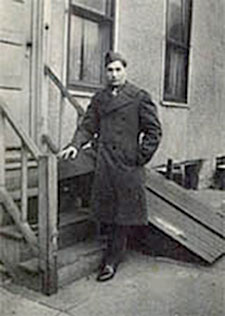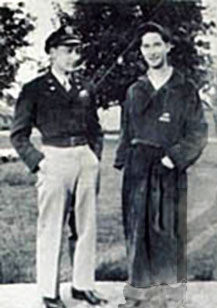
Established April 14, 1942
 |
American Ex-Prisoners of War
A not-for-profit, Congressionally-chartered veterans’ service organization advocating for former prisoners of war and their families.
Established April 14, 1942 |


Morton before going overseas, on a 3 day pass
|

At a hospital after being liberated
|

Morton speaks to high school students about being a POW
|
| Last Name | First Name, Middle Init. | Nickname |
| Spouse | City | State, Zip |
| Conflict — Theatre | Branch of Service | Unit: |
| Military Job | Date Captured | Where Captured |
| Age at Capture | Time Interned | Camps |
| Date Liberated | Medals Received | |
| After the War ... | ||
Living conditions were bleak. Two men to a bunk, bunks stacked to the ceiling. A small potbelly stove, useless without fuel. A slit trench for a toilet, and the barracks full of men with dysentery.
Breakfast was chicory boiled in water. Dinner was turnip greens boiled in water and a loaf of black bread by eight men. "We learned after the war that 50 percent of it was sawdust," Brooks says.
For 10 to 12 hours a day, he and his fellow prisoners dug tunnels into a rocky mountainside, removing cart after cart of rubble. "The overseer in my mine shaft was just brutal," said the 87-year-old, a retired psychologist living in Boynton Beach. "If someone collapsed, his view of it was the person was malingering."
In early April 1945, the Germans began a forced march of the Berga prisoners, attempting to flee the approaching Americans. Three weeks into the march, the U.S. Armored 11th Division liberated the skeletal men.
Brooks weighed 75 pounds, his veins too shriveled for a blood transfusion, the skin rubbed off his toes from so many days of walking. He spent eight months in hospitals and rehabilitation centers before his December 1945 discharge.
"I knew I wanted to come back home. As I tell the students, my mother would've killed me if I didn't come back," Brooks says. "You just had to keep your thoughts on staying alive. Those who said they couldn't take it, they didn't. They passed away."
Excerpted from "We are a Band of Brothers"
By Staci Sturrock, Palm Beach Post, May 25, 2013